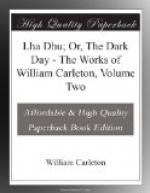His brother Felix, in all that was amiable and affectionate, strongly resembled him; but there the resemblance terminated Felix was subject to none of his gloomy moods or violent outbursts of temper. He was manly, liberal, and cheerful—valued money at its proper estimate, and frequently declared, that in the choice of a wife he would never sacrifice his happiness to acquire it.
“I have enough of my own,” he would say; “and when I meet the woman that my heart chooses, whether she has fortune or not, that’s the girl that I will bring to share it, if she can love me.”
Felix and his sister both, resided together; for after his father’s death he succeeded to the inheritance that had been designed for him. Maura O’Donnell was in that state of life in which we feel it extremely difficult to determine whether a female is hopeless or not upon the subject of marriage. Her humors had begun to ferment and to clear off into that thin vinegar serum which engenders the exquisite perception of human error, and the equally keen touch with which it is reproved. Time, in fact, had begun to crimp her face, and the vinegar to sparkle in her eye with that fiery gleam which is so easily lit up at five and thirty. Still she loved Felix, whose good-humor constituted him a butt for the irascible sallies of a temper more nearly allied to his brother Hugh’s than his own. He was her younger brother, too, of whom she was justly proud; and she knew that Felix, in spite of the pungency of her frequent reproofs, loved her deeply, as was evident by the many instances of his considerate attention in bringing her home presents of dress, and in contributing, as far as lay in his power, to her comfort.




